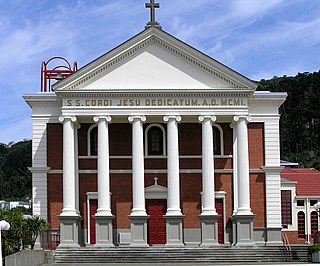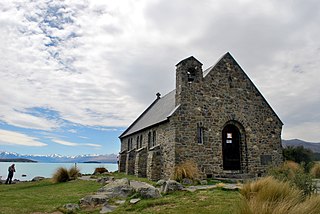The history of the Jews in Oceania starts with early explorers, sealers and whalers. Jewish and other settlers arrived in Oceania from the eighteenth century. They settled in Australia and New Zealand, and then on the smaller islands of Oceania.
The history of the Jews in Oceania starts with early explorers, sealers and whalers. Jewish and other settlers arrived in Oceania from the eighteenth century. They settled in Australia and New Zealand, and then on the smaller islands of Oceania.
The history of the Jews in New Zealand began when Jewish traders arrived there during the 1830s. [1] Before New Zealand became a British Colony in 1840, the Jewish population consisted of fewer than 30 people, including noted early settler Joel Samuel Polack. Immigration has led to four main groups: older families who came from the United Kingdom in the nineteenth century, lineage of European refugees from the 1930s and 1940s, families who emigrated from Britain in the 1950s, and recent immigrants from South Africa, Israel and the former Soviet Union. Prominent New Zealand Jews include nineteenth century Premier Sir Julius Vogel and at least five Auckland mayors, including Dove-Myer Robinson.
In the 2013 New Zealand Census, 6,867 individuals professed an affiliation with Judaism, out of the total New Zealand population of 4.5 million. [2] The majority of New Zealand Jews reside in Auckland and Wellington.

The demographics of New Zealand encompass the gender, ethnic, religious, geographic, and economic backgrounds of the 5 million people living in New Zealand. New Zealanders, informally known as "Kiwis", predominantly live in urban areas on the North Island. The five largest cities are Auckland, Christchurch, Wellington, Hamilton, and Tauranga. Few New Zealanders live on New Zealand's smaller islands. Waiheke Island is easily the most populated smaller island with 9,660 residents, while Great Barrier Island, the Chatham and Pitt Islands, and Stewart Island each have populations below 1,000. New Zealand is part of a realm and most people born in the realm's external territories of Tokelau, the Ross Dependency, the Cook Islands and Niue are entitled to New Zealand passports.

Oceania is a geographic region that includes Australasia, Melanesia, Micronesia and Polynesia. Spanning the Eastern and Western Hemispheres, Oceania has a land area of 8,525,989 square kilometres (3,291,903 sq mi) and a population of over 41 million. When compared to continents, the region of Oceania is the smallest in land area and the second smallest in population after Antarctica.

The culture of New Zealand is essentially a Western culture influenced by the unique environment and geographic isolation of the islands, and the cultural input of the indigenous Māori people and the various waves of multi-ethnic migration which followed the British colonisation of New Zealand.

The Catholic Church in New Zealand is part of the worldwide Catholic Church under the leadership of the Pope in Rome.

New Zealanders, colloquially known as Kiwis, are people associated with New Zealand, sharing a common history, culture, and language. People of various ethnicities and national origins are citizens of New Zealand, governed by its nationality law.

European exploration and settlement of Oceania began in the 16th century, starting with Portuguese settling the Moluccas and Spanish (Castilian) landings and shipwrecks in the Marianas Islands, east of the Philippines, followed by the Portuguese landing and settling temporarily in the Tanimbar or the Aru Islands and in some of the Caroline Islands and Papua New Guinea, and several Spanish landings in the Caroline Islands and New Guinea. Subsequent rivalry between European colonial powers, trade opportunities and Christian missions drove further European exploration and eventual settlement. After the 17th century Dutch landings in New Zealand and Australia, but not settling these lands, the British became the dominant colonial power in the region, establishing settler colonies in what would become Australia and New Zealand, both of which now have majority European-descended populations. New Caledonia (Caldoche), Hawaii, French Polynesia, Norfolk Island and Guam also have significant European populations. Europeans remain a primary ethnic group in much of Oceania, both numerically and economically.
European New Zealanders are New Zealanders of European descent. Most European New Zealanders are of British and Irish ancestry, with smaller percentages of other European ancestries such as Germans, Greeks, Poles, French, Dutch, Scandinavians, Croats and other South Slavs. The term European New Zealander can also encompass people who are of indirect European descent, if they should so identify, including Americans, Canadians, South Africans and Australians.

Religion in Australia is diverse. Section 116 of the Constitution of Australia of 1901 prohibits the Commonwealth government from establishing a church or interfering with the freedom of religion. In an optional question on the 2016 Census, 52.2% of the Australian population declared some variety of Christianity. Historically the percentage was far higher; now, the religious landscape of Australia is changing and diversifying. In 2016, 30.1% of Australians stated "no religion" and a further 9.6% chose not to answer the question. Other faiths include Muslims (2.6%), Buddhists (2.4%), Hindus (1.9%), Sikhs (0.5%), and Jews (0.4%).
The history of the Jews in Fiji is intertwined with the settlement of the Fiji islands by European explorers and settlers. Most of these settlers arrive in Fiji via Australia and New Zealand.

Migration to New Zealand began with Polynesian settlement in New Zealand, then uninhabited, about 1250 to 1280. European migration provided a major influx following the signing of the Treaty of Waitangi in 1840. Subsequent immigration has been chiefly from the British Isles, but also from continental Europe, the Pacific, the Americas and Asia.
Religion in New Zealand encompasses a wide range of groups and beliefs. Almost half of New Zealanders stated they had no religion in the 2018 census and 6.7 percent made no declaration. However, Christianity remains the most common religion; 37 percent of the population at the 2018 census identified as Christian. Around six percent of the population is affiliated with non-Christian religions. Hinduism is the second-most popular religion, claiming 2.6 percent of the population, and Sikhism is the fastest-growing faith.
The first Jewish settlers in New Zealand were Anglo-Jewish traders. Small numbers of Anglo-Jewish immigrants followed, some subsidized by a Jewish charity in London which had a mission of caring for the poor and orphaned young people in the community. These "subsidised" Jewish immigrants were also intended by their benefactors to be devout members of the fledgling Jewish community in Wellington, to which the respected English business leader Abraham Hort, Senior, was sent from London to organize along London religious lines. The difficulties of life in early colonial New Zealand, together with historically high rates of intermarriage, made it hard to maintain strict religious observation in any of the new congregations.

Christianity in New Zealand dates to the arrival of missionaries in the early 19th century. It became New Zealand's largest religious group, but no one denomination dominated and there was no official state church. Today, slightly less than half the population identify as Christian. The largest Christian groups are Catholic, Anglican and Presbyterian. Christian organisations are the leading non-government providers of social services in New Zealand.
The English diaspora consists of English people and their descendants who emigrated from England. The diaspora is concentrated in the English-speaking world in countries such as the United States, Canada, Australia, New Zealand, Scotland, Ireland, Wales and to a lesser extent, South Africa, South America, and continental Europe.

The Māori are the indigenous Polynesian people of mainland New Zealand. Māori originated with settlers from eastern Polynesia, who arrived in New Zealand in several waves of waka (canoe) voyages between roughly 1320 and 1350. Over several centuries in isolation, these settlers developed their own distinctive culture, whose language, mythology, crafts and performing arts evolved independently from those of other eastern Polynesian cultures. Some early Māori moved to the Chatham Islands where their descendants became New Zealand's other indigenous Polynesian ethnic group, the Moriori.
European Australians or White Australians are citizens or residents of Australia whose ancestry originates from the peoples of Europe. They form the largest panethnic group in the country.
Italian New Zealanders are New Zealanders of Italian descent or Italian-born people who reside in New Zealand. The 2013 Census counted 3,795 New Zealanders of Italian descent. Italian-New Zealander culture is prominent across New Zealand, with the culture influencing New Zealand's art, food and drink, and film industry- similar to that of Italian Australian culture.
Egyptian New Zealanders are New Zealand citizens and New Zealand permanent residents of Egyptian descent. According to the New Zealand 2013 Census, 1,110 New Zealand citizens and permanent residents declared that they were of Egyptian descent.
Norfolk Islanders also referred to as just Islanders are the inhabitants or citizens of Norfolk Island, an external territory of Australia. The Islanders have their own unique identity and are predominantly people of Pitcairn and English descent and to a lesser extent of Scottish and Irish.
| | This article related to Jewish history is a stub. You can help Wikipedia by expanding it. |
| | This Oceania-related article is a stub. You can help Wikipedia by expanding it. |